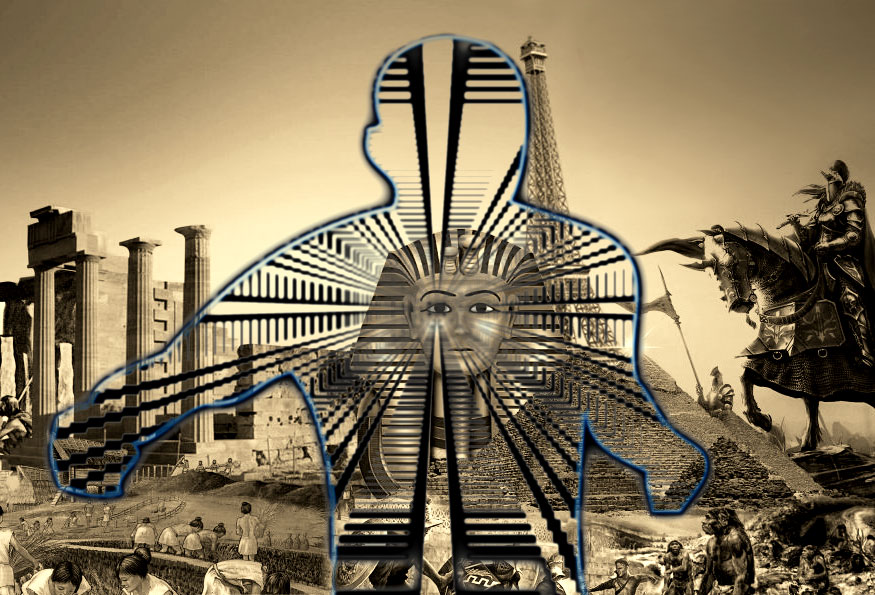Past Life Influences ~ Part I
 by Nancy C. Pohle & Ellen L. Selover
by Nancy C. Pohle & Ellen L. Selover
Reincarnation is the theory that, as souls, we each experience many lifetimes for the purpose of developing spiritually and becoming true co-creators with God. Some cultures and religious traditions teach the transmigration of souls; that is, that a soul can incarnate as human, animal, or even insect. However, in the model of reincarnation which Cayce embraced, the souls of humans, animals, and other creatures are totally different, with separate purposes and environments in which to seek perfection. If this is an accurate interpretation of the human soul’s appearances in the earth, then, potentially, we have all experienced numerous lives throughout human history, through diverse cultures, within all races, as both male and female, in every type of economic, social, and political circumstance. We may have experienced every religious conviction, devoted ourselves to a life of service or to amassing material wealth, raised families, lived a celibate life, and fought, killed, or died for our convictions. We may have experienced peace in an idyllic setting, felt the thrill of adventure and discovery, developed a gift or talent, or all of these.
Cayce suggests that, from a spiritual perspective, we may both lose and gain in a given lifetime through the choices we make. For example, we may have at one time experienced a life of great power and vast wealth, a seemingly perfect existence. However, if we chose to use that power in a manner detrimental to others, we may have lost ground from a spiritual perspective. If we used our position of affluence to bring comfort to those less fortunate, we may have increased our spiritual understanding through the application of that compassion.
Ideally, the recognition of our soul’s direct connection with our Creator is gradually enhanced and our spiritual development deepened through our lifetimes on earth. As we attempt to fulfill our unique purposes, we grow with each incarnation, adding depth and breadth to our many levels of understanding. This knowledge then becomes available to us through our intuition.
Two main components of reincarnation as described in the Cayce material are important to address, because they help us to understand this dynamic life cycle. These are karma and grace. In very basic terms, karma is the law of cause and effect: We reap what we sow, whether in this lifetime or in one to come. If we plant within ourselves seeds of resentment, hatred, intolerance, or harsh judgments through our thoughts, words, or actions, we eventually draw those things to us in one form or another.
“…whatsoever an entity, an individual sows, that must he reap. That as law cannot be changed. As to whether one meets it in the letter of the law or in mercy, in grace, becomes the choice of the entity.” 5001-1
So, if we are loving, gentle, kind, and caring in our thoughts and interactions with others, we will magnify those qualities in ourselves and see them reflected back to us in others. Regardless of the situations in which we find ourselves, how we act or react determines what we sow within ourselves.
Without an awareness of past life experiences, we continue to act and react in what become karmic patterns. We might liken them to old television reruns—the plot never changes. The characters never develop. They are bound to replay endlessly the same missteps and routines.
We move out of the cycle of karma and into a state of grace when we consciously choose to change the pattern and act out of unconditional love rather than react as we previously have. We can choose to respond to difficult, even painful, experiences with love, compassion, and forgiveness. Jesus offered us the supreme example of grace in action when He cried out from the cross, “Father, forgive them, for they know not what they do.”
Another aspect of reincarnation that is helpful in examining past life influences is that we choose the parents and environment into which we are born. Now, it might appear that some of us are better at making those choices than others! But apparently that choice has to do with the larger picture of our soul growth; we incarnate into an experience that will allow us the opportunity to learn and grow in the ways in which we have need. Not that everything we experience is predestined; indeed, we all have the ability to exercise our free will and are sometimes at the mercy of others expressing theirs. But the ultimate responsibility for our spiritual growth rests within each one of us, from the choice to enter a life experience to every other choice we make in relationship to our ideal.
Cayce also suggested that souls tend to reincarnate in groups. Because of soul memory, we are drawn to people and circumstances that have been important influences in previous experiences. We have many traveling companions on this journey. For example, our co-workers of today might have been part of our monastery in another lifetime. Our current parents might have been our siblings or cousins previously. Close friends in this life might have been relatives in another. Though it may be difficult to understand at times, the ultimate purpose for our coming together again and again is to be teachers for one another as well as students on our spiritual journeys.
“For, one enters a material sojourn not by chance, but there is brought into being the continuity of pattern or purpose, and each soul is attracted to those influences that may be visioned from above. Thus there the turns in the river of life may be viewed.
“To be sure, there are floods in the life; there are dark days and there are days of sunshine. But the soul-entity stayed in a purpose that is creative, even as this entity, may find the haven of peace as is declared in [the Creator].” 3128-1
We might wonder why memories of these previous lifetimes are so inaccessible, especially if they can be helpful. The following quote from the Cayce readings seems to imply that the information becomes available to us only as it becomes pertinent or useful to our immediate circumstances; these memories surface from our own soul’s memory banks as we have need of them.
“One may ask, as this entity—why, then, does one not recall more often those experiences?
“The same may be asked of why there is not the remembering of the time when two and two to the entity became four, or when CAT spelled cat. It always did! Ye only became aware of same as it became necessary for its practical application in the experience!
“So with the application of self’s experience in material sojourns. When the necessity arises, as to how, where and in what direction those opportunities were applied, the entity brings those influences to bear in its relationships to daily problems.” 2301-4
Benefits of Recognizing Past Life Influences
The purpose of the foregoing is to suggest methods for becoming conscious of past life memories and to explain how to apply those insights in our present circumstances. When we learn to recognize those thoughts, feelings, actions, and reactions which result from past life experiences, we can gain insights into our own nature, into our relationships with others, and even into our personal relationship with God.
We can choose how to act or react, just as we can choose which feelings to give energy to or those we would rather try to release. We can learn how to better focus our talents and abilities in order to express our true selves or to embark on a new career path. We can better understand which relationships need to be nurtured and which need to be healed. We can find ways to redirect negative behavior patterns or to forgive ourselves and others. What seemed impossible before we understood a past life connection can suddenly seem natural, even easy. Sometimes, just recognizing past associations gives us enough emotional objectivity to release and move on.
Emotions are our link across time from one life experience to the next. Carolyn Gelone, a spiritual counselor, author, and former educator, explains the connection. “The emotional link is the tie that binds us to the memories of the past. According to the Cayce readings, emotions experienced on the earth plane are met again in later lives . . . They come to us in what Cayce called ‘urges.’ The emotional urges that are negative usually have a limiting aspect, and they affect growth patterns adversely.”
Negative emotions or urges are those which we might need to transform in some way. When the urge is joyful or hopeful, we can take steps to express those positive memories or abilities in our current life circumstance. Not only can we find solutions to very tangible concerns through recognizing past life memories, but, as with many other forms of intuitive insights, we also can make tremendous strides in healing relationships and promoting our own spiritual growth. As with all forms of intuitive knowledge, we need to access and apply that information with discernment and balance, with a genuine desire to learn, and, most important, with a firm commitment to following our unique spiritual path. When we do so, the potential for personal growth from the application of this knowledge is infinite.
Unlocking Clues to Past Lives
How do we know when a current situation is being influenced by a previous incarnation? Glimpses of past life memories come to us in a variety of ways. By learning to recognize clues, we can bring that intuition more fully into consciousness. The following are examples of clues to past life influences:
Instant, unexplainable recognition of a person you’ve never met or a place you’ve never been. Holly related the following experience she had while on a trip through the English countryside:
“I was going to skip visiting this particular cathedral; we’d seen so many on the tour. But I decided to go through quickly anyway. Stepping into the sanctuary, I was overcome by a desire to bow down on the cold stone floor. I instead sat in a nearby pew for a few moments to get my bearings. Then I made my way to the choir loft at the front of the cathedral. Within moments, I could hear an invisible choir singing and recognized within the music my father’s deep voice. Since he had recently passed away, I felt comforted; perhaps this was the experience for which I had been drawn in. As I exited the loft, I became aware that there was something else I needed to see. A priest approached and asked if everything was all right. I tried to explain my experience and he responded, ‘This isn’t the only church on this site, you know.’ He then led me outside, down a stone stairway and through a huge wooden door into an ancient Norman chapel. At once, I knew the place—the round room with benches along the side, the round stone altar in the front, and the intricate arched design of the ceiling. All feelings of anxiety and discomfort dissipated, leaving me with a wonderful peaceful feeling.”
Strong emotional reactions; unexplained fears, animosity toward someone, or, conversely, instant attraction and connection. Carol Ann recounted a spontaneous past life recollection in response to a puzzling emotional development in her relationship with her new husband.
“I had been wondering why I had such an emotional reaction whenever William would go out of town. I would be inexplicably clingy and tearful, afraid for his safety, and anxious that he wouldn’t return. One morning, while discussing it together, I suddenly saw myself standing in the doorway of a prairie homestead, long skirt trailing around my ankles, waving goodbye as he rode off with the horse and wagon. He was going to St. Louis for supplies and was expected to be gone for several days. My next impression was several men bringing him back dead, and I started crying uncontrollably. I felt that it was accidental; apparently there had been a storm and a tree had fallen on him.”
After the initial images, Carol Ann tried to retain the feeling of the experience in order to get a better sense of the time period and the nature of their relationship.
“I stayed with the vision and saw that we’d had two sons, and a third child was on the way. Our younger son was ‘helping’ William mend a fence, looking up at him with special admiration . . . In this lifetime, William is very handy at building things, and he seemed to have the same talent then . . .”
Unexplained talent or desire to pursue a particular profession or hobby. From the above example, we might conclude that William’s special knack for building things in this lifetime could be a talent he developed in his life on the prairie. In the following example, we see how extraordinary talent can manifest at a very young age.
Jean shared the story of her nephew, who at the age of five received a new basketball. Within moments of acquiring it, this young boy could dribble the ball expertly and shoot hoops with perfection. When asked how he had learned to play so well, he replied, “I used to practice all the time when I was a teenager.”
Similarly, Mozart composed complex pieces of music as early as age five. This tremendous musical ability is nearly impossible to explain, except through the theory of reincarnation. Edgar Cayce himself was told in many of his personal life readings that he had been adept in the psychic and spiritual realms and had been a healer in a number of his previous lifetimes. Those gifts did not go away, but were enhanced and utilized in more creative ways than before.
A physical challenge or hardship that seems to have no basis in current reality. Carolyn had always wanted to wear contact lenses, but, despite numerous attempts, she experienced severe eye irritations that made wearing contacts impossible. Doctors could find no physical reason for her discomfort. Carolyn decided to undergo a hypnotic past life regression to recall a lifetime that might have triggered this strange physical reaction.
The appropriate memory came through with a gruesome but poignant image that left no doubt in her mind as to its relationship to her current condition. Carolyn saw herself in an ancient setting where she was being tortured. A startlingly graphic scene unfolded in which her eyes were poked out with wooden stakes! From that image she knew immediately why she was so fearful of putting foreign objects in her eyes in her present lifetime.
Accessing information without prior learning. Nancy’s niece Willa was only three years old when she began listening to operas and watching a videotape of Mozart’s The Magic Flute. She seemed to have an uncanny ability to mimic the German dialogue from the tape, even though no one in her family spoke that language. Two years later, while Nancy was visiting, Willa began speaking in German. When asked why, Willa said, “Oh, I just get so tired of speaking English.”
Willa’s unusual ability and desire to listen to Mozart’s music at such a young age might be a carry-over from a former lifetime in which she had some close connection with the composer.
Recognizing patterns in yourself that aren’t apparent in other family members. Erica described an experience that answered many perplexing questions:
“A friend and I went to visit The Cloisters museum, which was originally a monastery. We walked through rooms filled with tapestries, paintings, and other art. We admired the perfectly manicured, peaceful gardens. I especially enjoyed the piped-in Gregorian chants that filled the patios, though I had never before heard those sounds.
“Going back inside, I pushed open the huge oak door and glanced at the floor to be sure of my footing. What I saw when I looked down amazed me. Rather than my sneakers, I saw sandaled feet and, above that, a coarse brown robe. Just a flash and then it was gone.
“I told my friend, who had studied the Cayce material, about the experience. She just smiled and said, ‘You’ve been there before.’
“The thought that I may once have been a monk helps to explain some aspects of myself. I have a quiet reserve that differs from my buoyant family. I am religious in that I have a conscientious approach to most things—consistent, mindful, and respectful. I adore lettering of all kinds and dabble with calligraphy. As a child, I enjoyed sitting alone and just being quiet. My whole view of life seemed very different from my family and schoolmates.”
Spontaneous past life recall in children. One parent told us that three-year-old Timothy once declared, “I’m glad I’m a boy this time. I was a girl last time, and it was really boring!” A four-year-old boy, Martin, often talked of having flown planes before. Once while watching a television show in which a plane crashed, he burst into tears, crying that it was just like what happened to his beautiful plane. Martha shared an experience with her granddaughter, Peggy, who commented, “Remember when I was the mommy, and you were my little girl?”
Cayce suggested that parents write down statements and experiences such as these to share with their children at a future time. Children have much easier access to past life experiences; those memories are closer to the surface and have not yet been screened out from their consciousness. However, these memories are as difficult to hold onto as the wisps of a dream and may quickly dissipate and be forgotten unless they are recorded.
Excerpt from Awakening The Real You
See Part II here.
Posted in Other Topics, Past Life Therapy, Reincarnationwith comments disabled.





